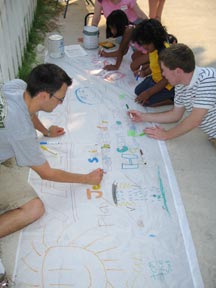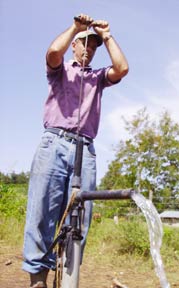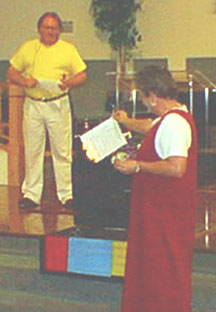Calvary Waco bridges gap between church, community
Posted: 6/23/06
| A student leads volunteers and children in a “get to know you” game. |
Calvary Waco bridges gap
between church, community
By Laura Frase
Communications Intern
WACO—Sharyn Dowd drives down a street lined with debilitated and deteriorating houses, testifying to the neighborhood’s poverty. But three houses particularly stand out, marked by perfectly clipped lawns, white picket fences, sidewalks and streetlamps.
A woman smiles and waves at her. The woman works a rather rough-looking yard in an attempt to beautify it.
This is North Waco, a work in progress with help from Calvary Baptist Church of Waco and the Community Development Corporation, which is affiliated with Mission Waco.
The church always has been involved with the community and neighborhood, said Dowd, ministry associate for neighborhood outreach at Calvary Baptist.
The area around Calvary Baptist has been marked by transition. As the city grew, longtime residents moved away, and the neighborhood’s ethnic and socio-economic make-up changed, Dowd said.
 |
| Student volunteers from Calvary Baptist Church in Waco color with a child at a neighborhood Bible club. |
Waco’s Community Development Corporation is a faith-based organization focused on providing housing for people in need and teaching them skills to care for a house and manage money.
“We help people who are renters become homeowners,” said Darrel Abercrombie, the organization’s program administrator.
While Abercrombie stresses the importance of owning a home, he said: “Renting is not a bad thing. It’s just a temporary thing.”
The organization offers classes every Thursday night in six-week intervals that teach about down payments, credit counseling, loans and other aspects of home buying.
Even after a house has been purchased, the faith-based group offers a post-purchase program, where “we teach them how to maintain the property and to take care of their investment,” Abercrombie said.
After the new family moves into a house, Calvary members and workers with the Community Development Corporation throw a “welcome to the neighborhood” party.
“We want to create a place where people know their neighborhood and neighbors,” Abercrombie said.
His group’s vision is to have well-taken- care-of homes, sidewalks and street lamps provided by the city—“because light dispels problems; the Scripture says that,” he said.
While the vision of a well-kept neighborhood is set, “a house is not a home until you bring God into the midst of it,” Abercrombie said.
In 2001, when the Community Development Corporation started, Calvary Pastor Julie Pennington-Russell preached a sermon titled, “Fools for Christ.” She talked about how Christians do things other people think are weird, but asked, “What could be more foolish for Christians to do than to move into the neighborhood surrounding the church?”
Since then, several members have moved into the area near the church.
“The idea is to choose an urban neighborhood, and this is about as urban as you can get in a city this size,” Dowd said.
Meg and Ralph Cooper were among the first members of Calvary Baptist to call North Waco their new home. He is an attorney who works out of his home, and she is a student at Baylor University’s Truett Seminary.
The Coopers always had wanted to renovate a house, but they never thought about it as missionary work. Cooper said they were attracted to the house through the Community Development Corporation.
“The community has potential, but it needed people with skills to come in and help,” Mrs. Cooper noted.
Drugs and prostitution plague North Waco. “When we first moved out here, no pizza places would even deliver here,” Cooper said.
Even though the area wasn’t “exactly a low-crime rate area,” the couple knew they wanted to focus on the neighborhood.
“One of the ways to change the world is to change a house, a block, a neighborhood,” Mrs. Cooper said.
The Coopers provide out-of-the-ordinary ministry from their home—a bologna sandwich ministry.
“If people ask for money, we don’t give it to them. If they ask for money for food, I give them a bologna sandwich and an apple—the same thing I have for lunch,” Cooper said.
Mrs. Cooper had an unusual request one day as she was working in her front yard. A woman, who probably had not showered in two days, asked to use her shower.
“I would never have had somebody ask to use my shower before, but this was like an everyday Matthew 25 kind of thing,” she said. “What if that were Jesus asking to use my shower?”
After their first shower request, Cooper said, they’ve started thinking about turning a room in the basement into temporary lodging and making a shower available.
The Coopers are hosting a neighborhood Bible club this summer, one of several held in the neighborhood near Calvary Baptist Church.
Calvary introduced the neighborhood Bible club to give children a chance to have fun and learn about God.
“The church has always been involved with the community and neighborhood,” Dowd said.
“One of the ways we get the people involved with the community is we started out having people walk to lunch after church. We would walk to neighborhood restaurants so people would see that you won’t get mugged just walking to lunch.”
Even though Calvary has had two opportunities to move to the suburbs, the church voted to stay both times to continue ministering and bonding with the people of the neighborhood. “It’s easy to preach about it, but they are choosing to live out the Scripture in front of people. Some people don’t read Scripture, but they will read your life as you live it,” Abercrombie said.
News of religion, faith, missions, Bible study and Christian ministry among Texas Baptist churches, in the BGCT, the Southern Baptist Convention ( SBC ) and around the world.





